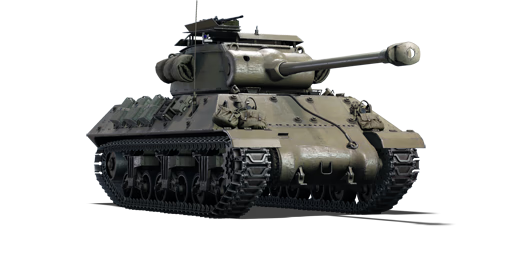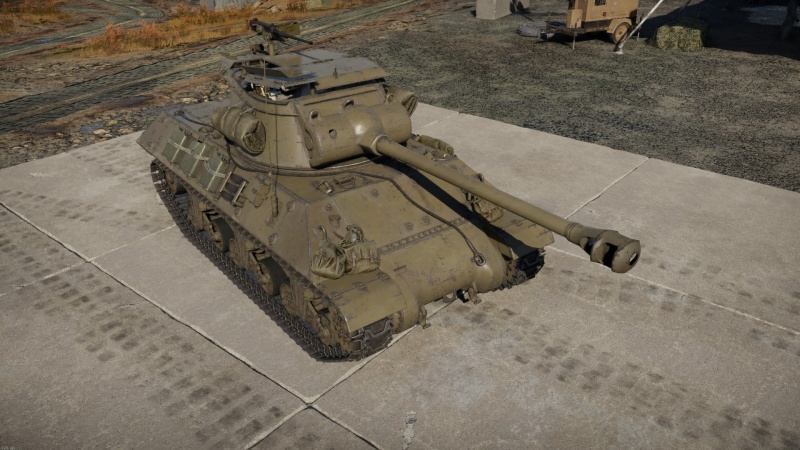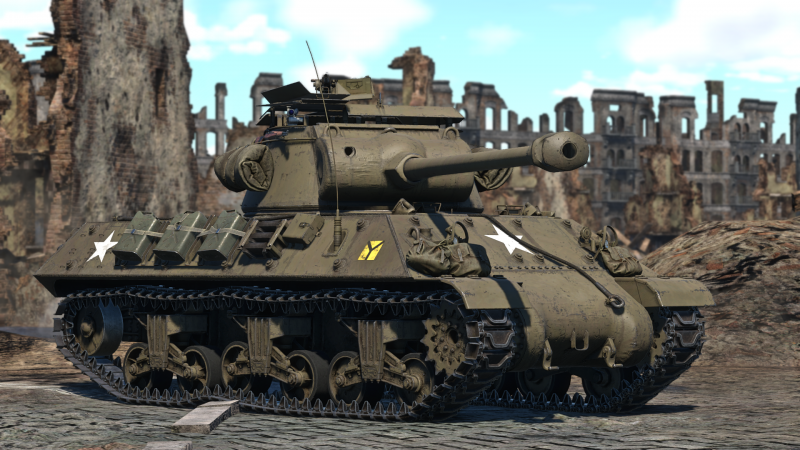Difference between revisions of "M36B2"
m (Specs-Card ArtImage Added) |
(New Description Project - USA Priority: Tanks - M36B2) (Tag: Visual edit) |
||
| Line 11: | Line 11: | ||
== Description == | == Description == | ||
<!-- ''In the description, the first part should be about the history of the creation and combat usage of the vehicle, as well as its key features. In the second part, tell the reader about the ground vehicle in the game. Insert a screenshot of the vehicle, so that if the novice player does not remember the vehicle by name, he will immediately understand what kind of vehicle the article is talking about.'' --> | <!-- ''In the description, the first part should be about the history of the creation and combat usage of the vehicle, as well as its key features. In the second part, tell the reader about the ground vehicle in the game. Insert a screenshot of the vehicle, so that if the novice player does not remember the vehicle by name, he will immediately understand what kind of vehicle the article is talking about.'' --> | ||
| − | The ''' | + | The '''M36B2 tank destroyer, formally known as the 90 mm Gun Motor Carriage M36B2''', was an improved version of the [[M36 GMC]] tank destroyer deployed by the U.S. Army near the end of World War II and throughout the Korean War. The M36B2 shared many traits with the original M36 GMC, including the same armour layout, engine, and main anti-tank gun. Beginning in May 1945, the American Locomotive Company rebuilt 672 M10 hulls into the 90 mm Gun Motor Carriage M36B2 variant. In May 1945, the Montreal Locomotive Works delivered another batch of 52 M36B2s. As Germany in World War II unconditionally surrendered in May 1945, this upgraded variant of the M36B2 saw no combat following its introduction. Instead, it was heavily utilized by the U.S. Army and the Republic of Korea Army against Soviet-made North Korean armoured vehicles during the Korean War, which began five years later, in 1950. Because [[M26]] and [[M46]] tanks were in short supply, the M36B2 became one of the favoured armoured vehicles for MAP (Military Assistance Program) transfers. |
| + | |||
| + | Introduced in the [[Update "Drone Age"]], the M36B2 GMC performs extremely similarly to the original M36 GMC. Armoured turret cover shields were added to the M36B2, providing some modest protection against small artillery shrapnel and strafing by small-calibre aircraft machine guns. Despite this, the vehicle remains poorly armoured, leaving it vulnerable to strafing by large-calibre aircraft heavy machine guns or aircraft cannons. For the M36B2 variant, new HEAT-FS ammunition has become available, allowing it to engage strongly armoured enemy vehicles at a significantly greater range with reliability. | ||
== General info == | == General info == | ||
| Line 156: | Line 158: | ||
;Skins | ;Skins | ||
| + | |||
* [https://live.warthunder.com/feed/camouflages/?vehicle=us_m36b2 Skins and camouflages for the {{PAGENAME}} from live.warthunder.com.] | * [https://live.warthunder.com/feed/camouflages/?vehicle=us_m36b2 Skins and camouflages for the {{PAGENAME}} from live.warthunder.com.] | ||
Revision as of 10:09, 7 August 2023
| This page is about the American tank destroyer M36B2. For other versions, see M36 Jackson (Family). |
Contents
Description
The M36B2 tank destroyer, formally known as the 90 mm Gun Motor Carriage M36B2, was an improved version of the M36 GMC tank destroyer deployed by the U.S. Army near the end of World War II and throughout the Korean War. The M36B2 shared many traits with the original M36 GMC, including the same armour layout, engine, and main anti-tank gun. Beginning in May 1945, the American Locomotive Company rebuilt 672 M10 hulls into the 90 mm Gun Motor Carriage M36B2 variant. In May 1945, the Montreal Locomotive Works delivered another batch of 52 M36B2s. As Germany in World War II unconditionally surrendered in May 1945, this upgraded variant of the M36B2 saw no combat following its introduction. Instead, it was heavily utilized by the U.S. Army and the Republic of Korea Army against Soviet-made North Korean armoured vehicles during the Korean War, which began five years later, in 1950. Because M26 and M46 tanks were in short supply, the M36B2 became one of the favoured armoured vehicles for MAP (Military Assistance Program) transfers.
Introduced in the Update "Drone Age", the M36B2 GMC performs extremely similarly to the original M36 GMC. Armoured turret cover shields were added to the M36B2, providing some modest protection against small artillery shrapnel and strafing by small-calibre aircraft machine guns. Despite this, the vehicle remains poorly armoured, leaving it vulnerable to strafing by large-calibre aircraft heavy machine guns or aircraft cannons. For the M36B2 variant, new HEAT-FS ammunition has become available, allowing it to engage strongly armoured enemy vehicles at a significantly greater range with reliability.
General info
Survivability and armour
Armour type:
- Rolled homogeneous armour (Turret, Hull)
- Cast homogeneous armour (Gun mantlet, Transmission area)
| Armour | Front (Slope angle) | Sides | Rear | Roof |
|---|---|---|---|---|
| Hull | 38.1 mm (54°) Front glacis 50.8-107.8 mm (6-70°) Transmission housing |
19.05 mm (38°) Top 25.4 mm Bottom |
19.05 mm (31-36°) Top 19.05 mm (13-45°) Bottom |
19.5 mm 10 mm |
| Turret | 31.75 mm (5-53°) Turret front 76.2 mm Gun mantlet |
31.75 mm (14-21°) | 25.4 mm (0-22°) | 6.5 mm |
Notes:
- Tracks are 20 mm thick, bogies are 10 mm thick while the wheels are 20 mm thick.
- Small slivers of 5 mm armour hang off the top side hull armour, giving minuscule protections at those areas.
- Track blocks on the side hull armour allows an extra 20 mm of armour at their locations.
Mobility
| Game Mode | Max Speed (km/h) | Weight (tons) | Engine power (horsepower) | Power-to-weight ratio (hp/ton) | |||
|---|---|---|---|---|---|---|---|
| Forward | Reverse | Stock | Upgraded | Stock | Upgraded | ||
| Arcade | 44 | 6 | 29.9 | 582 | 782 | 19.46 | 26.15 |
| Realistic | 41 | 6 | 363 | 410 | 12.14 | 13.71 | |
Modifications and economy
Armaments
Main armament
The 90 mm M3 is the same gun available for the Super Hellcat, the T25 or the M26 and stays reliably accurate until 800 m distance. Beyond 1,000 m the loss of accuracy becomes a real handicap. The high muzzle velocity of your shells grants you pretty flat firing trajectories and thus helps fire at moving targets from a distance. In that regard, using the "sight distance control" feature can increase your chances of successfully hitting enemy tanks.
The rotation speed of the gun is better than average compared to other tanks at the same rank or battle rating. Which makes tracking a target from a distance an easy task to perform as your targeting process is fast. Elevation and depression angles of the gun are important, allowing you to fire from unusual positions (behind a ridge, from uphill, etc.). Your reload time is similar to vehicles at the same BR, if not a little longer than average. Your recoil is important but not powerful enough to throw your gun off target after firing. Lacking a stabilizer, the tank can't reliably fire on the move.
| 90 mm M3 | Turret rotation speed (°/s) | Reloading rate (seconds) | |||||||||||
|---|---|---|---|---|---|---|---|---|---|---|---|---|---|
| Mode | Capacity | Vertical | Horizontal | Stabilizer | Stock | Upgraded | Full | Expert | Aced | Stock | Full | Expert | Aced |
| Arcade | 47 | -10°/+20° | ±180° | N/A | 21.1 | 29.3 | 35.5 | 39.3 | 41.8 | 9.75 | 8.63 | 7.95 | 7.50 |
| Realistic | 14.3 | 16.8 | 20.4 | 22.6 | 24.0 | ||||||||
Ammunition
The available ammunition allows for engaging all types of targets:
- T33: APBC; a solid shot with an average penetration power and no explosive filler.
- M71: HE; useful for destroying open and lightly armoured vehicles.
- M304: APCR; a composite round with a very high penetration power but no explosive filler and will only penetrate flat vertical surfaces.
- M82: APCBC; a capped armour-piercing shell with a ballistic cap that has a better but still average penetration power and an explosive filler. It will destroy any armoured target it penetrates.
- M348: HEATFS; a HEAT round with very high penetration and excellent performance on angled armour
- M313: Smoke; useful to blind enemy vehicles that are too remote for you to disable so that you can progress towards objectives.
| Penetration statistics | |||||||
|---|---|---|---|---|---|---|---|
| Ammunition | Type of warhead |
Penetration @ 0° Angle of Attack (mm) | |||||
| 10 m | 100 m | 500 m | 1,000 m | 1,500 m | 2,000 m | ||
| T33 shot | APBC | 175 | 172 | 160 | 146 | 134 | 122 |
| M71 shell | HE | 20 | 20 | 18 | 17 | 16 | 16 |
| M304 shot | APCR | 287 | 281 | 259 | 234 | 211 | 191 |
| M82 shot | APCBC | 185 | 182 | 170 | 156 | 144 | 132 |
| M348 shell | HEATFS | 305 | 305 | 305 | 305 | 305 | 305 |
| Shell details | ||||||||||||
|---|---|---|---|---|---|---|---|---|---|---|---|---|
| Ammunition | Type of warhead |
Velocity (m/s) |
Projectile mass (kg) |
Fuse delay (m) |
Fuse sensitivity (mm) |
Explosive mass (TNT equivalent) (g) |
Ricochet | |||||
| 0% | 50% | 100% | ||||||||||
| T33 shot | APBC | 853 | 10.91 | - | - | - | 47° | 60° | 65° | |||
| M71 shell | HE | 823 | 10.55 | 0.2 | 0.1 | 1,210 | 79° | 80° | 81° | |||
| M304 shot | APCR | 1,021 | 7.62 | - | - | - | 66° | 70° | 72° | |||
| M82 shot | APCBC | 853 | 10.91 | 1.2 | 14 | 137.2 | 48° | 63° | 71° | |||
| M348 shell | HEATFS | 853 | 6.5 | 0.05 | 0.1 | 926.17 | 65° | 72° | 77° | |||
| Smoke shell characteristics | ||||||
|---|---|---|---|---|---|---|
| Ammunition | Velocity (m/s) |
Projectile mass (kg) |
Screen radius (m) |
Screen deploy time (s) |
Screen hold time (s) |
Explosive mass (TNT equivalent) (g) |
| M313 | 821 | 10.7 | 9 | 5 | 20 | 50 |
Ammo racks
| Full ammo |
1st rack empty |
2nd rack empty |
3rd rack empty |
4th rack empty |
5th rack empty |
6th rack empty |
Visual discrepancy |
|---|---|---|---|---|---|---|---|
| 47 | 39 (+8) | 30 (+17) | 21 (+26) | 12 (+35) | 7 (+40) | 1 (+46) | No |
Machine guns
| 12.7 mm M2HB | ||||
|---|---|---|---|---|
| Mount | Capacity (Belt) | Fire rate | Vertical | Horizontal |
| Pintle | 1,000 (200) | 577 | -10°/+70° | ±60° |
Usage in battles
Describe the tactics of playing in the vehicle, the features of using vehicles in the team and advice on tactics. Refrain from creating a "guide" - do not impose a single point of view but instead give the reader food for thought. Describe the most dangerous enemies and give recommendations on fighting them. If necessary, note the specifics of the game in different modes (AB, RB, SB).
Pros and cons
Pros:
- Fast speed
- Roof cover to protect from air attacks
- Fast turret traverse
- Carries a powerful gun
- HEATFS and APCBC to fight German heavies and post-war vehicles
- Browning .50 cal to deal with light vehicles and aircraft
Cons:
- Slow and lacking in manoeuvrability when stock
- Most opponents can penetrate your thin armour with autocannons, guns, and bombs
- Roof armor is 6.5 mm thick, meaning most cannons and rifle-calibre weaponry can knock out the crew
- HEATFS explodes on fences and bushes
- Useless APCR shell
- Stock APBC is mediocre
- HEATFS sometimes requires extra shots for destroying heavily-armoured targets
History
Describe the history of the creation and combat usage of the vehicle in more detail than in the introduction. If the historical reference turns out to be too long, take it to a separate article, taking a link to the article about the vehicle and adding a block "/History" (example: https://wiki.warthunder.com/(Vehicle-name)/History) and add a link to it here using the main template. Be sure to reference text and sources by using <ref></ref>, as well as adding them at the end of the article with <references />. This section may also include the vehicle's dev blog entry (if applicable) and the in-game encyclopedia description (under === In-game description ===, also if applicable).
Media
- Skins
See also
- Other M36B2s
External links
Paste links to sources and external resources, such as:
- topic on the official game forum;
- other literature.
| USA tank destroyers | |
|---|---|
| M10 | M10 GMC |
| M36 | M36 GMC · M36B2 |
| T95 | T28 · T95 |
| M109 | M109A1 |
| ATGM | LOSAT · M901 |
| Wheeled | M3 GMC · T55E1 |
| Other | M8 HMC · M50 · M56 |
| China | ▃LVT(A)(4) (ZIS-2) |






